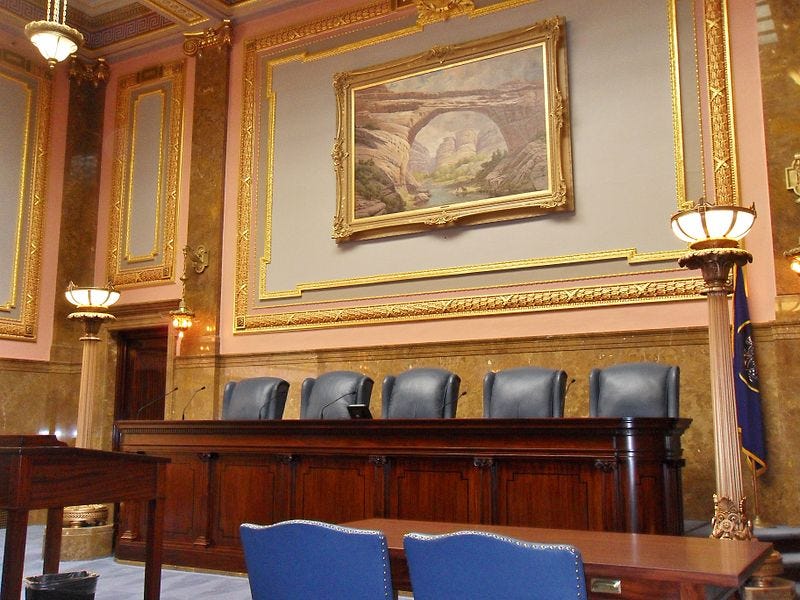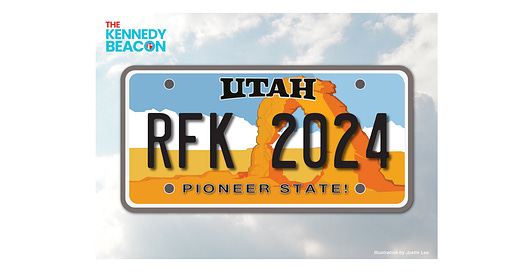Kennedy Clears First Hurdle, in Utah, in 50-State Ballot Access Push
By Leah Watson, The Kennedy Beacon
On January 3, Robert F. Kennedy Jr. announced that he qualified to appear on the ballot in Utah. It was his first ballot access victory but many challenges lie ahead.
“Utah has once again shown that it is the pioneer state,” Kennedy said during a ballot access status event held in Salt Lake City. “It is the first of the 50 states and the District of Columbia that we are going to register and get on the ballot.” This achievement was made possible by dedicated volunteers who braved the harsh winter elements to offer Utah voters the ability to vote for Kennedy.
In contrast, Kennedy shared that the campaign has been encountering delays in obtaining ballot petitions from a few states where the signature process has begun. Kennedy described this as an “undemocratic lock that the major political parties have on [the ballot access] process,” as the two major political parties have numerous restrictions in place, making it difficult for a third-party candidate to get on the ballot.
Kennedy, however, expected these setbacks. He and his legal team are prepared; he is not deterred from his mission to gain ballot access across the country.
During the announcement, Kennedy expressed his appreciation for Utah lieutenant governor Deidre Henderson’s cooperation with the Kennedy campaign, and for removing an unconstitutional early deadline for submitting signatures.
It was only last month, on December 7, that Kennedy succeeded in extending a deadline in the Utah ballot access law requiring independent presidential candidates to submit a certificate of nomination and 1,000 voter signatures by January 8, 2024 – months ahead of any other state.
Kennedy initiated a suit against Utah on December 4, claiming the January 8 deadline is unconstitutionally restrictive. According to Paul Rossi, an attorney for the Kennedy campaign who spoke to The Salt Lake Tribune, the new and extremely early deadline had been put in place to prevent third-party candidates from appearing on the ballot. In the previous 2020 election cycle, the deadline had been in August. Kennedy and his team filed an expedited preliminary injunction and sued for an extension. On December 7 the injunction was heard and the deadline moved to March 5, 2024. This new deadline is only temporary, as the lawsuit seeking a permanent change in the law, to an August deadline, is ongoing.
Why Kennedy Filed the Lawsuit
With such a short window for collection, from November 1 to January 8 and during the cold holiday weeks, Utah volunteers would face a struggle to gather enough valid petition signatures. Petition signers have to be registered voters; they have to use the same address as their registration address; and all of this must be written legibly. The campaign is required to validate these signatures – a process that, according to Kennedy’s civil action lawsuit, can take several weeks to complete. Many of the collected signatures could be deemed invalid in the process. The petitions must be “validated with county election clerks, collected and prepared for filing … before January 8, 2024 … along with the required Certificate of Nomination no later than the close of business on January 8, 2024,” reads Kennedy’s Complaint for Declaratory and Injunctive Relief.
Kennedy and his team argued that the January 8 deadline is unconstitutional under the First and Fourteenth Amendments. They also pointed out that no other state has such an early deadline to validate and file a ballot access petition – only eleven months before the election.

The lawsuit also includes claims from four other plaintiffs: Steve Maxfield, the Liberty Initiative Fund, Trenton Donn Pool, and Accelevate 2020. These other attorneys and organizations are dedicated to holding the government accountable and specialize in ballot access and petitioning. Their claim challenged the Utah ban on “out-of-state petition circulators … as a violation of clearly established rights under the First and Fourteenth Amendments.”
Typically, signature collectors are paid by the number of signatures they obtain. Utah, however, has a requirement where circulators are paid by the number of hours worked, which could make the petitioning process more costly and time-consuming. Utah signature collectors are also required to wear a badge identifying them as paid petition circulators. The civil action calls these requirements so restrictive as to create unnecessary hardships for independent candidates.
Utah law also requires presidential candidates to submit the name of a vice-presidential candidate (or at least a placeholder name, which could later be changed) on the final paperwork. Kennedy has not yet announced who his running mate might be. Twenty-seven states require a vice president to be named as part of the initial paperwork for an independent run.
In an interview on NewsNation, host Chris Cuomo discussed with Kennedy the difficulties he faces as he tries to get on the ballot in 50 states. “There are some states that deliberately make it very very difficult to get on the ballot,” Kennedy told Cuomo. “You have to get signatures notarized and you have to get them from every county, and you have to do it in a very short amount of time … it’s a very heavy lift but we are going to be able to do it … we are going to be on the ballot in every state and the District of Columbia.”
During the interview, Kennedy stated that his campaign was able to collect 1,600 signatures in Utah within two weeks. Although Kennedy had all the signature requirements for Utah, he was determined to follow through with the litigation because it is such an unconstitutional law.
Other States’ Requirements
States’ rules and conditions for achieving ballot access vary in a number of ways: the number of voter signatures necessary; when signature collection may start; the submittal date for signatures; the submittal process; whether or not a vice-presidential nomination and the candidate’s Electoral College voters are required to be included on the petition; and a litany of other requirements. The details of these requirements can be found on Ballot Access News.
Deirdre Goldfarb, special counsel for American Values 2024 (AV24), who is leading the super PAC’s ballot access effort, said that “AV24 is reviewing all the legal requirements for ballot access through the standard three methods: new party, independent run, and write-in requirements.”
As a super PAC, AV24 is prohibited from communicating directly with the Kennedy campaign. However, while not able to coordinate with the campaign poses some difficulty, AV24 is determined to help with ballot access in the states in which it can operate independently of the campaign and the candidate. [In late December, the super PAC announced it would make seven states its priority - Arizona, California, Georgia, Illinois, Michigan, New York and Texas.]
The greatest pressure against ballot access for independent candidates is the array of requirements that states present with regard to signature collection. For instance, Massachusetts requires the candidate to have signatures from every district. In Indiana, every signature needs to be collated by page number. In a large state such as California, where the candidate is required to have 219,403 signatures – many of which, possibly up to half, may not be considered valid – “it’s going to be very costly,” said Goldfarb. “Once we put in our buffer, we recommend we collect at least 285,000 signatures.” In California, signature collection opens April 26 and closes August 9, a small window considering the number of signatures necessary. The process will also be difficult in New York, where “signature collection opens April 16 and closes May 28. That’s a six-week period to collect 70,000 signatures with a buffer,” said Goldfarb.
Only a few states allow an independent candidate to begin signature collection at any time. These include Oklahoma, Maryland, Missouri, South Carolina, Nevada, Colorado, North Carolina, Oregon, Michigan, and Indiana. In these states, signature collection is now open. Utah began its signature collection period on November 1, as did Tennessee, New Jersey, Idaho, Mississippi, Vermont, Nebraska, New Hampshire, Iowa, Alaska, Wyoming, North Dakota, Alabama, Arkansas, Kansas, Montana, Ohio, Hawaii, Delaware, and West Virginia. Arizona started its collection period soon thereafter, on November 5.
Some of these state hurdles are very challenging for independent candidates to overcome. Historically, only one independent presidential candidate, Ross Perot, was able to get on the ballot in all 50 states. Goldfarb explained that “a lot of [independent candidates] pursue access by getting on an approved party line, like the Reform Party or the American Independent Party, as opposed to a pure independent run.”
During his ballot access update in Salt Lake City, Kennedy discussed the “archaic rules” he and his campaign face as he continues the ballot access drive. These rules “are all designed to suppress dissent and make sure that there are no options for Americans outside of the major political parties,” said Kennedy. He explained that some of the state rules are deliberately burdensome. West Virginia requires that “you have to register in every single county in the state before you start collecting ballots at all,” he said, while “Massachusetts will invalidate an entire page of signatures if there’s one stray mark on it.” This allows a great amount of room for error – error that can catastrophically derail a ballot access drive.
But the Kennedy campaign is determined to get on the ballot in all 50 states plus in Washington, DC.
Kennedy is actively petitioning for ballot access in Arizona, Missouri, and Maryland. According to Stefanie Spear, Kennedy’s press secretary, it’s likely that one of those states will be next to list Kennedy on its ballot.
As mentioned in the Utah ballot access meeting, 24 states require Kennedy to have electors before signature collection can commence, and 27 require a vice-presidential nomination. Because Kennedy has not selected a running mate, he is unable to begin securing a spot on the ballot in those 27 states yet. “We are not worried about that because almost all of those states have petition windows up to August, so we have a long time,” Kennedy said.
Spear concluded the Utah ballot access meeting by stating that the campaign is ready to take on anything that comes its way. “One down, 49 to go,” she said.
The information in this article is subject to change as Goldfarb and outside counsel are consistently researching, updating, and verifying ballot access information.






The DNC doesn't want RFK, Jr, Trump or any other political opponent who has a large support base.
This is why the J6 riot was falsely presented as an "insurrection." This is why Democrats falsely discredit and censor RFK, Jr, and refuse to provide him Secret Service protection. This is why states like Colorado and Maine violate the Constitution by incorrectly applying the 14th Amendment to disqualify Trump from state ballots.
The DNC sees RFK, Jr gaining steadily, and his poll numbers rising. They consider him a genuine threat, and they will take any and every illegal action to keep him from winning.
I don't doubt RFK's ability to get things done. And he has a legion of support, just as capable.